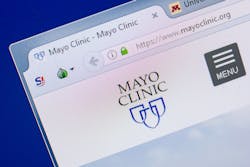Mayo Clinic Launches AI-Focused Diagnostic Platform Ventures
Mayo Clinic announced a new technology platform initiative designed to deliver clinical decision support tools, diagnostic insights and care recommendations to help clinicians make faster and more accurate diagnoses and provide continuous care to patients.
The Remote Diagnostics and Management Platform (RDMP) will connect data with artificial intelligence (AI) algorithms to augment decision-making within existing clinical workflows, Mayo Clinic said.
The Rochester, Minn.-based health system has launched two new companies, with partners, to support the newly created RDMP. Mayo Clinic and AI-driven health technology company nference have formed Anumana Inc. to create digital sensor diagnostics by applying nference AI to Mayo's repository of medical data. Anumana will focus initially on designing neural network algorithms based on billions of relevant pieces of heart health data in Mayo Clinic's Clinical Data Analytics Platform, including raw electrocardiogram (ECG) signals, to unlock hidden biomedical knowledge and enable early detection as well as accelerate treatment of heart disease.
Paul Friedman, M.D., chair of the Department of Cardiovascular Medicine at Mayo Clinic led the team that developed the algorithms. "Undiagnosed heart disease affects millions of Americans and people across the globe," he said in a statement. "For many conditions, such as a weak or thickened heart pump, or silent arrhythmias, effective evidence-based treatments exist that can prevent heart failure, stroke, or death. The key is to detect the disease before symptoms develop to prevent these events from happening. The addition of AI to the ECG, a ubiquitous and inexpensive point-of-care test that is already integrated into medical workflows, makes this approach good for patients, convenient for clinicians, and massively scalable."
Mayo Clinic also has partnered with Commure to launch Lucem Health Inc. to provide the platform for connecting remote patient telemetry devices with AI-enabled algorithms, including those developed by Anumana and Mayo Clinic, and for integrating diagnostic insights generated by these algorithms into clinical workflows. Mayo Clinic said Lucem's platform collects, orchestrates, and curates data from virtually any device; hosts and supports AI/ML runtime algorithms; and delivers application development frameworks and services for workflow integration.
"The dramatically increased use of remote patient telemetry devices coupled with the rapidly accelerating development of AI and machine learning algorithms has the potential to revolutionize diagnostic medicine," said John Halamka, M.D., president of the Mayo Clinic Platform, in a statement. “With RDMP, clinicians will have access to best-in-class algorithms and care protocols and will be able to serve more patients effectively in remote care settings. The platform will also enable patients to take more control of their health and make better decisions based on insights delivered directly to them.”
Anumana completed $25.7 million in Series A financing led by founders nference and Mayo Clinic along with Matrix Capital Management, Matrix Partners, and NTTVC. Lucem Health completed $6 million in Series A financing led by founders Mayo Clinic and Commure.


